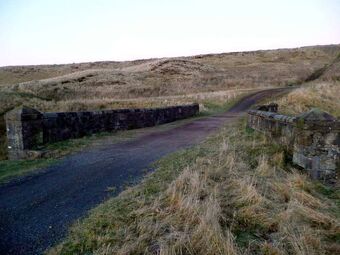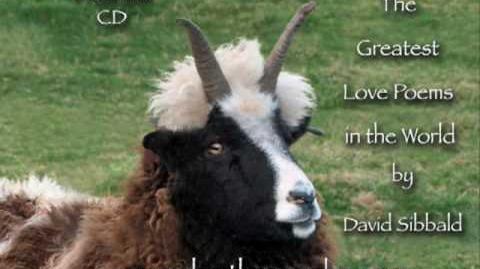
Tibbie's Bridge, near Kames, East Ayrshire, UK; named after Isobel "Tibbie" Pagan, whose howf was nearby. Photo by Gordon Brown. Licensed under Creative Commons, courtesy Geograph.org.
Isobel Pagan (?1740 - 3 November 1821) (sometimes "Isabel") was a Scottish poet.
Life[]
Pagan was born in 1741, about 4 miles from Nith-head in the Parish of New Cumnock, Ayrshire, where she lived until 14 years of age.[1]
She passed her life mainly in the neighbourhood of Muirkirk in Ayrshire.[2]
She lived alone, in a hut previously used as a brick-store, and seems to have conducted unchallenged an unlicensed traffic in spirituous liquor. Convivial companions frequently caroused with her in the evenings, and enjoyed her singing and recitation of verses by herself and others.[2]
Lame from infancy, she was an exceedingly ungainly woman,[2] and she also had a squint and a large tumor on her side.[1] She was misanthropical both from temperament and slighted affections. Offenders dreaded her vituperation;[2] she was in the habit of satirizing in verse those who had offended her. As she was unable to write, the local tailor Gemmell wrote out her verses.[1]
Known as Tibbie to her friends, she was noted for her sarcastic wit and was apparently an exceptional singer, often singing her own compositions to the delight of her rustic audience.[1] Her quaint character and her undoubted abilities kept her popular, and secured her the means of livelihood.[2]
Although never married she had a child by a man called Campbell, who deserted her on the eve of their marriage.[1]
She died on 3 November 1821, probably in her 80th year, and was buried in Muirkirk churchyard, where an inscribed stone marks her grave.[2]
Writing[]
A Collection of Songs and Poems by Isobel Pagan was published in Glasgow about 1805. These uncouth lyrics consist largely of personal tributes and references to sport on the autumn moors, in which the singer delighted.[2]
Her name lives, however, because legend credits her with the songs ‘Ca' the Yowes to the Knowes’ and the ‘Crook and Plaid,’ which are not in her volume. Burns, who had the former song taken down in 1787 from the singing of Rev. Mr. Clunie, seems to have revised and finished it for Johnson's Musical Museum (iv. 249, 316, ed. 1853). Cunningham (Songs of Scotland, iii. 276) recklessly attributes it to ‘a gentleman of the name of Pagan,’ of whom there is no trace; Struthers, in Harp of Caledonia, gives Isobel Pagan as the author; and the original form of the lyric is presumably hers.[2]
If, as seems to be unquestioned, she was capable of the "Crook and Plaid" — a simple and dainty pastoral, not to be confounded with H.S. Riddell's song with the same title — she clearly possessed qualities that would have enabled her to compose "Ca' the Yowes to the Knowes."[2]
Recognition[]
"Ca' the Yowes to the Knowes" was included in the Oxford Book of English Verse, 1250-1900.[3]
Publications[]
Poetry[]
- A Collection of Songs and Poems upon Several Occasions. Glasgow : printed by Niven, Napier & Khull, 1803, 1808.[4]
See also[]

Ca' The Yowes To The Knowes - Poem
References[]
Bayne, Thomas Wilson (1895) "Pagan, Isobel" in Lee, Sidney Dictionary of National Biography 43 London: Smith, Elder, p. 36. Wikisource, Web, Jun. 13, 2022.
- Patterson, James. The Contemporaries of Burns. 1840: 113-123
- Douglas, George. Scottish Minor Poets. 1891: 290.
Notes[]
- ↑ 1.0 1.1 1.2 1.3 1.4 Isabel Pagan, Wikipedia, Jan. 6, 2022. Web, Jun. 13, 2022.
- ↑ 2.0 2.1 2.2 2.3 2.4 2.5 2.6 2.7 2.8 Bayne, 36.
- ↑ "Ca' the Yowes to the Knowes". Oxford Book of English Verse, 1250-1900 (edited by Arthur Quiller-Couch). Oxford, UK: Clarendon, 1919. Bartleby.com, Web, May 6, 2012.
- ↑ Search results = au:Isabel Pagan, WorldCat, OCLC Online Computer Library Center Inc. Web, June 12, 2022.
External links[]
- Poems
- "Ca' the Yowes to the Knowes"
- "isabel Pagan at English Verse (6 poems)
- The Songs of Isabel Pagan
- About
- Pagan, Isobel or Tibbie (1741-1821) at the Burns Encyclopedia
This article incorporates text from a publication now in the public domain, the Dictionary of National Biography (edited by Leslie Stephen). London: Smith, Elder, 1885-1900. Original article is at: Pagan, Isobel
|